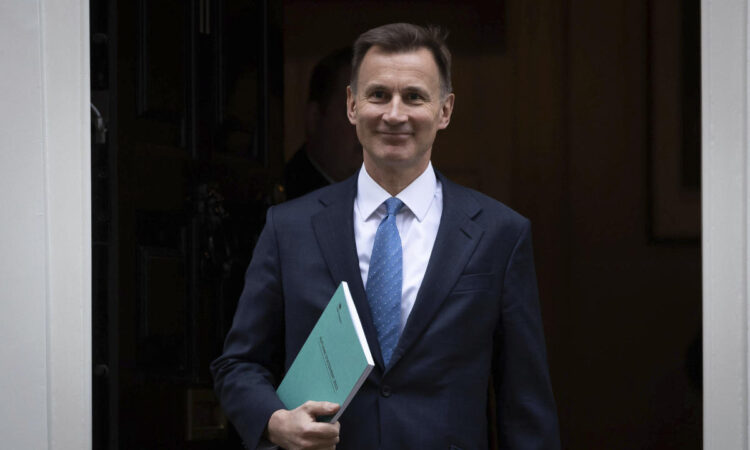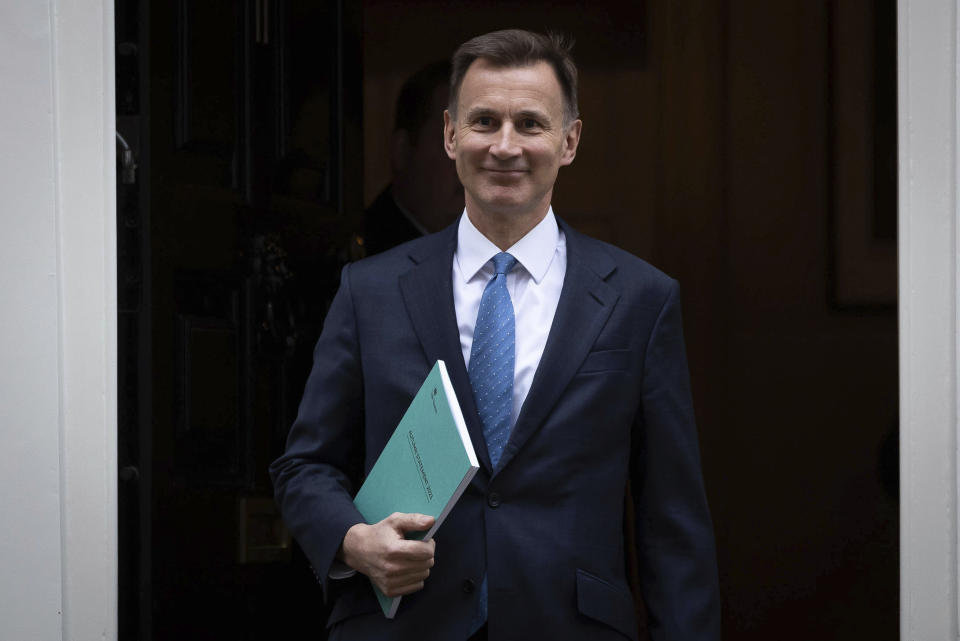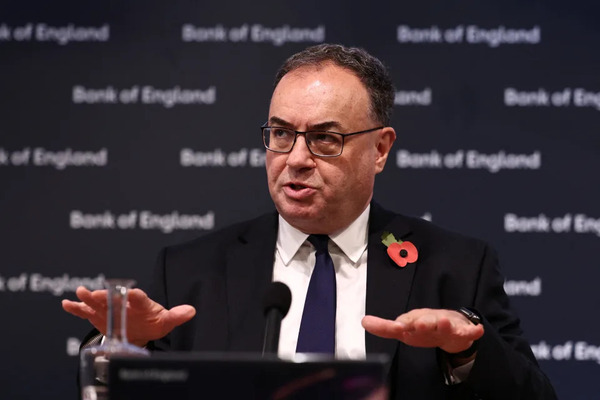

The FTSE 100 (^FTSE) and European stock markets were fairly muted on Thursday as traders digested Jeremy Hunt’s 110 measures from the autumn statement on Wednesday, as well as news that energy bills in the UK are set to rise by 5%.
According to new analysis from the Resolution Foundation, the richest are set to gain the most from the chancellor’s announcements in the Commons yesterday, with around 40% of the gains from the tax and benefit measures going to the richest fifth of the population.
The top 20% will gain £1,000 on average from Hunt’s changes, which is five times the £200 gained by the bottom fifth, the Foundation said.
London’s benchmark index was trading 0.3% higher by the end the day, staging a small recovery after spending most of the time in the red. Meanwhile the CAC (^FCHI) gained 0.3% in Paris, and the Frankfurt DAX (^GDAXI) was 0.2% higher.
The Stoxx 600 (^STOXX) was 0.3% up, with gains in healthcare, basic materials and energy offset by losses in consumer non-cyclicals and tech shares. Stocks on Wall Street were closed for Thanksgiving.
Pierre Veyret, technical analyst at ActivTrades, said: “European benchmarks opened without clear direction on Thursday after mixed macro data failed to bolster market sentiment ahead of a long weekend in the US.”
“Lower transaction volumes and decreased market volatility traditionally occur during the long Thanksgiving weekend, when US investors stay away from their trading desks.”
Torsten Bell, chief executive of the Resolution Foundation, said: “Tax cutting rhetoric clashed with tax rising reality, and positive steps to encourage business investment combined with a growth sapping hit to public investment.
“Ultimately this reflects the pressures, not only of an upcoming election, but of governing a sicker, older, slower growing Britain, amidst an era of far higher interest rates.
“That might be difficult for policy makers, but it’s a disaster for households whose wages are stuck in a totally unprecedented 20 year stagnation. This parliament is set to achieve a truly grim new record: the first in which household incomes will be lower at its end than its beginning.”
Read more: Trending tickers: Arm | Jumia | Country Garden | Virgin Money
It came as the European Central Bank (ECB) has said that financial markets remain exposed to adverse macro-financial and geopolitical developments, potentially amplified by vulnerabilities in some non-bank financial institutions.
According to the November 2023 Financial Stability Review, the full impact of tighter financial conditions on the real economy is yet to be felt.
Elsewhere, energy bills in the UK are set to rise by 5% from January as Ofgem lifts its cap to an average of £1,928.
This means households will pay an extra £94 on average per year on their energy bills.
Ofgem said the rise was caused by rising wholesale gas prices, which had been affected by world events “including the conflict in the Middle East”.
The energy price cap sets a limit on the maximum amount suppliers can charge households in England, Wales and Scotland for each unit of gas and electricity.
Energy in Northern Ireland is regulated separately.
-
Markets close and recap
Well that’s all from us today, thanks for following along. Be sure to join us again tomorrow.
Here’s a quick recap of some of the top stories from today:
Ofgem lifts energy price cap
NatWest to close 19 more branches
UK private sector grows at fastest in four months
Pound rises after PMI survey
Virgin Money down 4% after setting aside £309m for bad loans
Jet2 profits rise despite £14m hit from summer chaos
Have a good evening!
-
Turkey hikes interest rates to 40%
Turkey’s central bank has increased its key interest rate to 40% in a bid to battle inflation.
This is a rise of five percentage points from 35%. Economists had expected a smaller rise to 35.7%.
It came after inflation came in at 61% in the year to October, little changed on September’s figures
Timothy Ash, emerging markets strategist at BlueBay Asset Management, said.
Really impressive move by the CBRT [Central Bank of the Republic of Turkey] – probing their orthodoxy and getting well ahead of expectations.
These guys and girls are serious about fighting inflation. We need to give them credit for that.
-
Traders dampen expectations for UK interest rate cut next year

interest rate Governor of the Bank of England Andrew Bailey addresses the media during a press conference concerning interest rates, at the Bank of England, in London, Britain, November 2, 2023. HENRY NICHOLLS/Pool via REUTERS Money markets have suggested that the first Bank of England rate cut may not come until August, rather than in May/June as recently expected.
Bloomberg said:
Traders are betting the central bank will reduce rates by around 60 basis points in 2024, according to swaps tied to monetary-policy meeting dates. That means two quarter-point reductions are fully priced in — with the first cut in September. The chance of a third is about 40%.
-
UK faces two decades of lost pay growth
UK wages are now set to remain below their 2008 level until 2028.
That’s a totally unprecedented two lost decades of pay growth, according to the Resolution Foundation.
-
Financial stability outlook remains fragile, ECB finds
The ECB has said that financial markets remain exposed to adverse macro-financial and geopolitical developments, potentially amplified by vulnerabilities in some non-bank financial institutions.
According to the November 2023 Financial Stability Review, the full impact of tighter financial conditions on the real economy is yet to be felt.
Higher borrowing and debt service costs will increasingly test the resilience of euro area households, firms and governments.
It added that Euro area banks see profitability benefit from rising interest rates but face headwinds from higher funding costs, worsening asset quality and lower lending volumes.
The weak economic outlook along with the consequences of high inflation are straining the ability of people, firms and governments to service their debt,” said ECB Vice-President Luis de Guindos.
It is critical that we remain vigilant as the economy transitions to an environment of higher interest rates coupled with growing uncertainties and geopolitical tensions.
-
Commodity update: Gold
Gold (GC=F) prices are hovering just below the $2,000 mark, at 1,994.20.
The bullion price found strong support earlier in the week, as expectations that the Fed’s rate hiking cycle had ended consolidated amongst investors.
Ricardo Evangelista, senior analyst at ActivTrades, said:
The resulting mood led to a two-and-a-half-month low for the greenback and saw treasury yields drop, in a dynamic that benefited the non-yielding precious metal.”
However, the subsequent publication of hawkish Fed minutes cooled this enthusiasm, and the release of strong labour data on Wednesday compounded the sentiment of uncertainty as investors hesitated to call the next Fed monetary policy move.”
With the ‘higher-for-longer’ view lingering and receding expectations of a rate cut in the first half of 2024, the upside for gold prices may be limited.
-
Arm rises 5%

ARM company logo seen on STM32 microchip hold in tweezers and blurred ARM company logo on the background. London, United Kingdom, September 17, 2023 Shares of the central processing unit (CPU) architecture licensing company Arm Holdings (ARM) were on the rise in extended trading after Wells Fargo (WFC) initiated coverage the stock.
Wells Fargo is giving the company an ‘overweight’ rating with a $70 (£55.78) per share price target. Analysts at Wells Fargo pointed out the company’s chip designs and expanding markets in China among other reasons for the rating.
The stock has also been uplifted after reports that Nvidia (NVDA) will use technology from Arm Holdings to design central processing units that will run the Microsoft MSFT operating system.
Nvidia was one of Arm’s biggest financial supporters heading into the September IPO and actually tried unsuccessfully to acquire the company.
-
Pound rises after PMI survey

Sterling rose on Thursday to its highest against the dollar since early September after the PMI data.
Simon Harvey, head of FX analysis at Monex Europe, said:
November’s flash PMIs once again support our view that the UK economy is merely in a state of stagnation as opposed to outright contraction, like that seen in the eurozone.
In conjunction with structural supply issues which should keep short-term UK rates higher for longer relative to the eurozone, we expect the UK’s better relative growth prospects to support renewed upside in GBPEUR.
This has broadly been on display this morning, with the cross rallying two tenths of a percent as the PMI reports show diverging economic momentum and more credible inflation pressures in the UK, leading UK-eurozone rate spreads to widen.
-
UK private sector grows at fastest in four months
Britain’s private sector grew at its fastest pace in four months.
According to the latest S&P Global/CIPS Flash UK purchasing managers’ index (PMI), the UK’s services sector unexpectedly returned to growth in November, with a reading of 50.5.
This was thanks to the Bank of England (BoE) holding interest rates steady at 5.25% for a second meeting in a row, as well as improving business conditions.
The reading was up from 49.5 the previous month and ahead of analyst predictions of 49.5. Any figure above 50 indicates an expansion, whilst a reading below it means contraction.
Overall the private sector reading came in at 50.1.
-
NatWest to close 19 more branches
NatWest (NWG.L) is planning to close another 19 branches, mostly in the early part of next year.
The lender said it will shut 18 NatWest branches and one Royal Bank of Scotland site. These are mainly spread across England, apart from one in Pontypridd in Wales.
All the NatWest sites will close in either the latter part of February or early March, the bank said.
Three of the sites are in London, with others in Redcar, Bradford, Birmingham, Maldon and Dudley, among others.
The largest number of closures announced this year have been Barclays branches. The bank has said 185 of its sites are set to shut.
NatWest is second with 116 branches, followed by Lloyds (112), Halifax (72), Virgin Money (40), Bank of Scotland (28), Ulster Bank (10), TSB (nine), RBS (five), and Nationwide (one).
NatWest said:
As with many industries, most of our customers are shifting to mobile and online banking, because it’s faster and easier for people to manage their financial lives.
We understand and recognise that digital solutions aren’t right for everyone or every situation, and that when we close branches we have to make sure that no-one is left behind.
We take our responsibility seriously to support the people who face challenges in moving online, so we are investing to provide them with support and alternatives that work for them.
Watch: How does inflation affect interest rates?
Download the Yahoo Finance app, available for Apple and Android.






